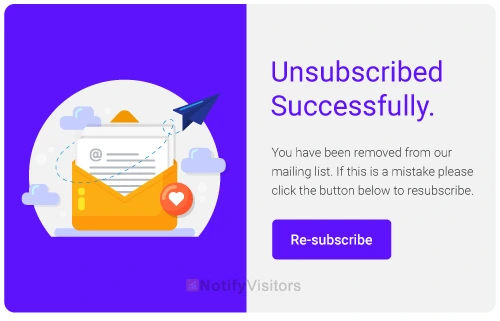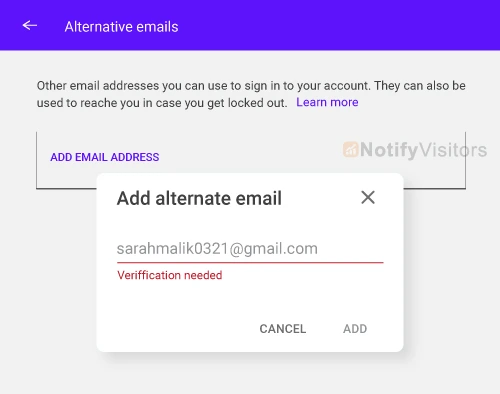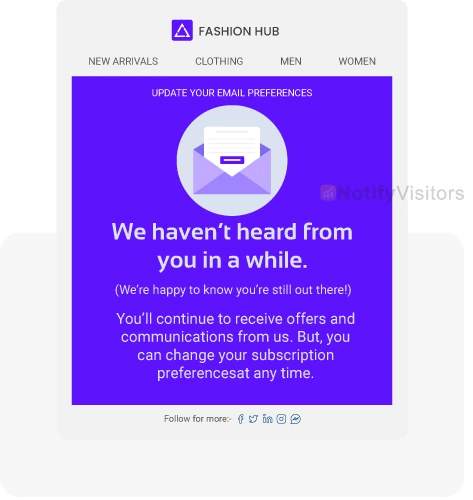In this digital age, staying in touch with your customers and subscribers is essential for building a successful online business. But have you ever wondered how to effectively manage an excessive influx of emails? If the answer to that question is ‘yes’, then you should probably pay attention to the best practices related to unsubscribing pages.
With so much content out there competing for users’ attention, it’s essential that we make our options available quickly and securely when they want out. With 14 proven techniques outlined below on how to win back previously unsubscribed subscribers by optimizing your unsubscribe page, now you can ensure maximum reach while creating loyal supporters as well!
Contents
Unsubscribe Page Best Practices You Should Implement
1. Confirm unsubscription
First, you must inform recipients you’ve heard them and removed them from your contact list. Let them understand that they can unsubscribe from your services anytime.
Make them assured that your request to confirm an unsubscription has been received and will be processed promptly. Inform them you value their privacy and hope your content has been informative and beneficial during your time with us.
Also, mention that you would happily welcome their return if they reconsider and continue to be a part of our community. They should not hesitate to contact your customer service team if they have any further questions or concerns.
2. Add the re-subscribe button

In today’s fast-paced world, it is not unusual for individuals to accidentally unsubscribe from a particular service or newsletter. This can be a frustrating experience, leaving them unable to obtain the information and updates they once enjoyed. However, adding a re-subscribe button can effortlessly remedy this situation for their subscribers.
This small but effective feature lets users quickly and easily re-subscribe to the content they once found valuable. By executing this functionality, you can strengthen your relationships with your audience by making it convenient for them to receive the desired content.
Therefore, it is highly suggested that you add this feature to your subscription services to fulfill the needs of your valued subscribers.
3. Ask users to take a very short survey
Request your users to participate in a brief survey that will take no more than a few minutes of their time. Ensure that their input is valuable to you as you try to understand their needs and preferences better. Users’ feedback will assist you in improving your services and user experience on your platform.
Moreover, assure them that all information provided will be kept confidential and used only for research purposes. Finally, don’t forget to appreciate their support and look forward to hearing from them soon.
4. Say you’re sorry
Convey to your recipients that you’re going to miss them.
Apologizing can be demanding, especially when the situation affirms a formal tone. However, saying sorry can usually be the first step towards fixing a strained relationship or correcting a mistake.
A formal apology indicates that you take responsibility for your actions and understand the seriousness of the situation.
It shows maturity and respect for the person you are apologizing to. Though it may be awkward or humbling, taking the initiative to apologize can lead to a stronger and healthier relationship with those around you.
So the next time you see yourself in a situation where you need to apologize formally, remember that a genuine and respectful apology can go a long way.
5. Provide alternative

Don’t send your subscribers email overload! If you’re spamming their inbox with daily updates, switch it to a biweekly newsletter.
And don’t forget to give them options, like the power to receive your emails on weekends if that’s more their kind. And if they choose to unsubscribe, make sure you have an incredible text message example to say goodbye on a high note.
6. Enable recipients to pause their subscriptions.
Once a user has clicked on the unsubscribe link, they will see your unsubscribe confirmation page. On this page, you can show users the following:
- re-subscribe;
- manage email preferences;
- pause their subscription.
A subscription break is a great method to enable users to stop receiving emails from you for a specific period (1 week, 30 days, 3 months, etc.) or a selling season if a subscriber doesn’t like obtaining a promotional sequence of holiday emails.
According to research, 63.3% of email marketers let their subscribers receive newsletters at different frequencies. It’s an ideal way to keep your recipients engaged and lower email unsubscription rates.
7. Ask users to fill out the form.
It is one of the best unsubscribe page best practices. Asking your users to take a moment to fill out the form provided. Suggesting them their feedback and input is important, as it allows you to continually enhance your services and offerings.
Your users’ thoughts and suggestions are deeply appreciated and will be considered in future changes or updates. Thank them in advance for their time and contribution to your ongoing efforts to deliver the best possible experience for your customers.
8. Never allow pop-up notifications on your unsubscribe pages.
Learning what practices to avoid is essential when maintaining an engaged email list. One of those practices is permitting pop-up notifications on your unsubscribe page. Not only can this be a frustrating experience for users, but it can also damage your brand’s reputation.
By interrupting the unsubscribe process with pop-ups, you are implying to your audience that their desire to leave your list is unimportant to you. This can lead to negative associations with your brand, resulting in fewer subscribers overall.
Therefore, it’s essential to always prioritize the user experience and make the subscription and unsubscribe processes as seamless as possible.
9. Let users unsubscribe from all of your newsletters.
As a reliable business, you should understand the importance of allowing your valued subscribers to opt out of receiving our newsletters. You must tell them that your newsletters may not be suitable for everyone and that you respect the right of individuals to decide what information they would like to receive.
Therefore, you have made it effortless for your subscribers to unsubscribe from our newsletters. Subscribers will be promptly removed from our mailing list by simply clicking on the ‘unsubscribe’ button at the bottom of any of our newsletters.
This honest approach allows you to build trust and keep a positive relationship with our subscribers.
10. Make unsubscribing easy

You probably don’t want to think about streamlining the unsubscribing process when creating a subscription-based business. But making the process easy can be beneficial for you and your customers.
Delivering a hassle-free customer experience is of utmost importance in the business world. With the increasing number of emails being sent these days, making the unsubscription process as painless as possible is essential.
No one would like to receive unwanted emails or newsletters, and customers enjoy the option of opting out with a single click.
By simplifying the unsubscription process, businesses can prevent negative feelings towards their brand and avoid being marked as spam.
Therefore, making unsubscribing straightforward for customers is necessary by providing clear and concise instructions and ensuring the process is straightforward.
This strategy will benefit the customer and help businesses maintain positive client relationships.
11. Ask contacts why they unsubscribed
It can be painful and frustrating when someone unsubscribes from our mailing list. But instead of focusing on the negative, let’s use this to gather feedback and enhance communication.
As a formal and professional organization, you need to value the opinions of your contacts and want to meet their needs. By asking why they unsubscribe, you can gain invaluable insights into how to engage better and serve your audience. You must understand everyone’s time is valuable, so you should appreciate any feedback.
Encourage your unsubscribers to share their thoughts and allow your business to make improvements that benefit everyone.
12. Give them other ways to stay in touch
An unsubscribe doesn’t indicate a customer never wants to hear from you again. They just don’t like to receive your emails currently.
It would help if you subtly delivered other options for them to stay in contact with your brand, like adding links to your social channels on the unsubscribe landing page.
Consider giving social links on your landing page and to your latest blog entry. This is a wonderful way to encourage contacts to stay engaged, even while they opt out of your email marketing.
13. Pre-populate the email address field
Providing a seamless and efficient user experience is essential in today’s digital age. One way to accomplish this is by pre-populating the email address field, saving users valuable time and effort.
By anticipating their requirements and simplifying the process, companies can communicate their commitment to customer satisfaction and user convenience.
Pre-populating the email address field can also lower the risk of typing errors and typos, leading to more precise data and better communication. With so many options available to users, staying ahead of the game and executing innovative and user-friendly features is vital.
14. Send a re-engagement email to inactive contacts

Some customers may never unsubscribe. They might be satisfied just to delete or never open your emails. Consider sending your inactive contacts a re-engagement email drip campaign.
This will facilitate them to update their email preferences or unsubscribe, enhancing your campaign metrics.
One great way to re-activate your customers is to show them an incentive. Put it like this; we are contacting you today to express our appreciation for your past business dealings with our company.
Keeping a consistent line of communication with your valued customers is important in keeping them updated and informed on recent happenings and continually enhancing your services. Moreover, mention that you have noted that they have been inactive in engaging with us recently, and you would love to hear from them.
You appreciate their previous support and look forward to the possibility of continuing our mutually beneficial business relationship.
15. Offer to update their email preferences
Another one of the unsubscribe page best practices is to offer your users to update their email preferences. Put it politely like we hope this message finds you well. We wanted to reach out and inform you of our email preferences update.
As technology and communication change, we have recently enhanced our email system to serve your needs better. These updates will give you a more personalized and customized experience with us. We comprehend that people receive countless emails daily and want to ensure that the information we send is relevant and valuable to you.
As such, please update your email preferences so we can tailor our communications to your specific interests. Your time is valuable, and we are dedicated to respecting it. We hope you will leverage this opportunity to receive our most meaningful content.
Thank you for your time and consideration. Putting it like this will warm their heart and let them update their preferences.
Conclusion
In conclusion, the key to winning back subscribers lies in properly utilizing unsubscribe page best practices. While there’s no one-size-fits-all approach to unsubscribing due to individual preferences, the 14 best practices outlined here provide a great starting point.
From offering further opt-out options and collecting feedback from subscribers who have unsubscribed to providing an explanation for why emails are being sent, these tips can help you win back those hard-to-reach customers.
By ensuring that your email efforts adhere to these 14 best practices—as well as taking advantage of data tracking tools such as gauging open rates and click-through rates—you will be able to more easily understand and target the needs of lost subscribers, thus increasing your chances of success when it comes to engaging them again in the future.
FAQs
1. What should the purpose of an unsubscribe page be?
The main objective of an unsubscribe page is to offer the subscriber an easy and hassle-free way to opt out of your email campaigns.
2. What information should be included on the unsubscribe page?
The unsubscribe page should include clear instructions on opting out of your email campaigns. This can be done by providing a one-click unsubscribe button or a link that takes subscribers to a page where they can unsubscribe. In case subscribers have questions or concerns, it is also important to include your contact information, such as your email address or phone number.
3. How can I make the unsubscribe process easier for subscribers?
Consider using a one-click unsubscribe button to make the unsubscribe process as easy as possible. This eliminates the need for subscribers to take additional steps or confirm their decision to unsubscribe. Additionally, consider providing options for subscribers to manage their email preferences instead of completely opting out.
Also Read:

























 Email
Email SMS
SMS Whatsapp
Whatsapp Web Push
Web Push App Push
App Push Popups
Popups Channel A/B Testing
Channel A/B Testing  Control groups Analysis
Control groups Analysis Frequency Capping
Frequency Capping Funnel Analysis
Funnel Analysis Cohort Analysis
Cohort Analysis RFM Analysis
RFM Analysis Signup Forms
Signup Forms Surveys
Surveys NPS
NPS Landing pages personalization
Landing pages personalization  Website A/B Testing
Website A/B Testing  PWA/TWA
PWA/TWA Heatmaps
Heatmaps Session Recording
Session Recording Wix
Wix Shopify
Shopify Magento
Magento Woocommerce
Woocommerce eCommerce D2C
eCommerce D2C  Mutual Funds
Mutual Funds Insurance
Insurance Lending
Lending  Recipes
Recipes  Product Updates
Product Updates App Marketplace
App Marketplace Academy
Academy

